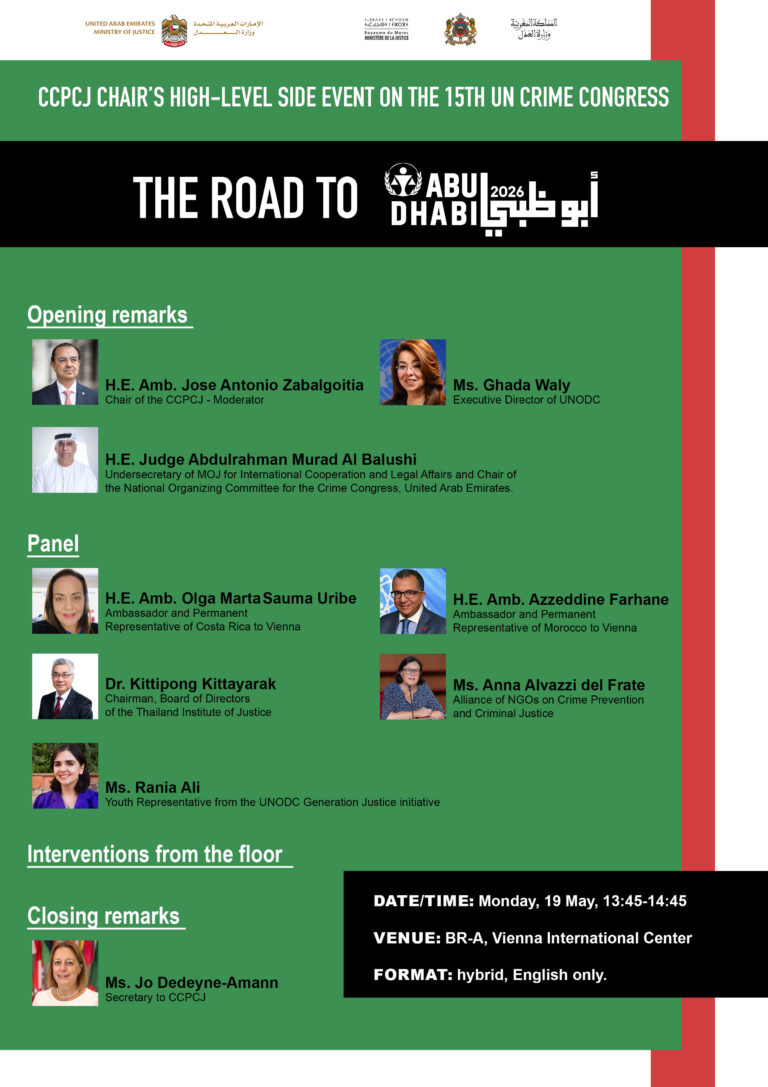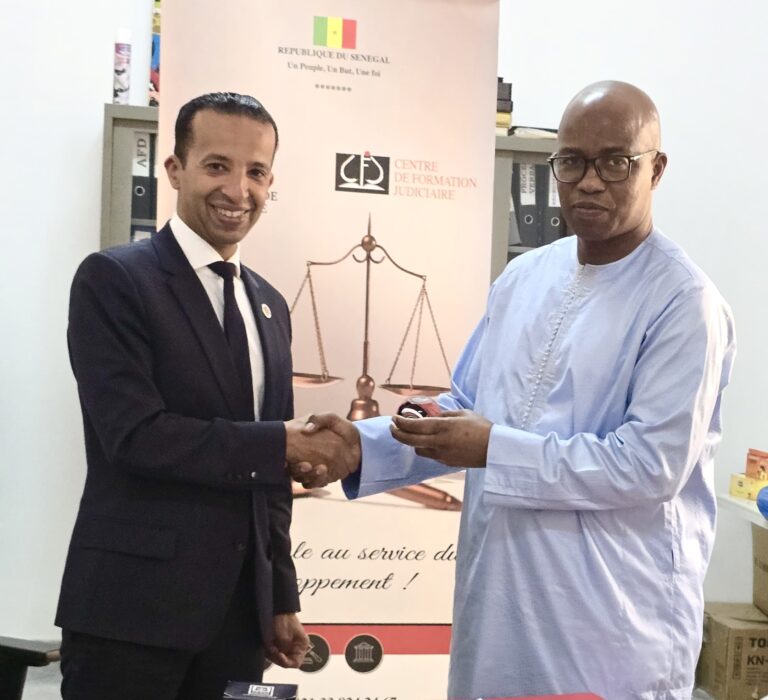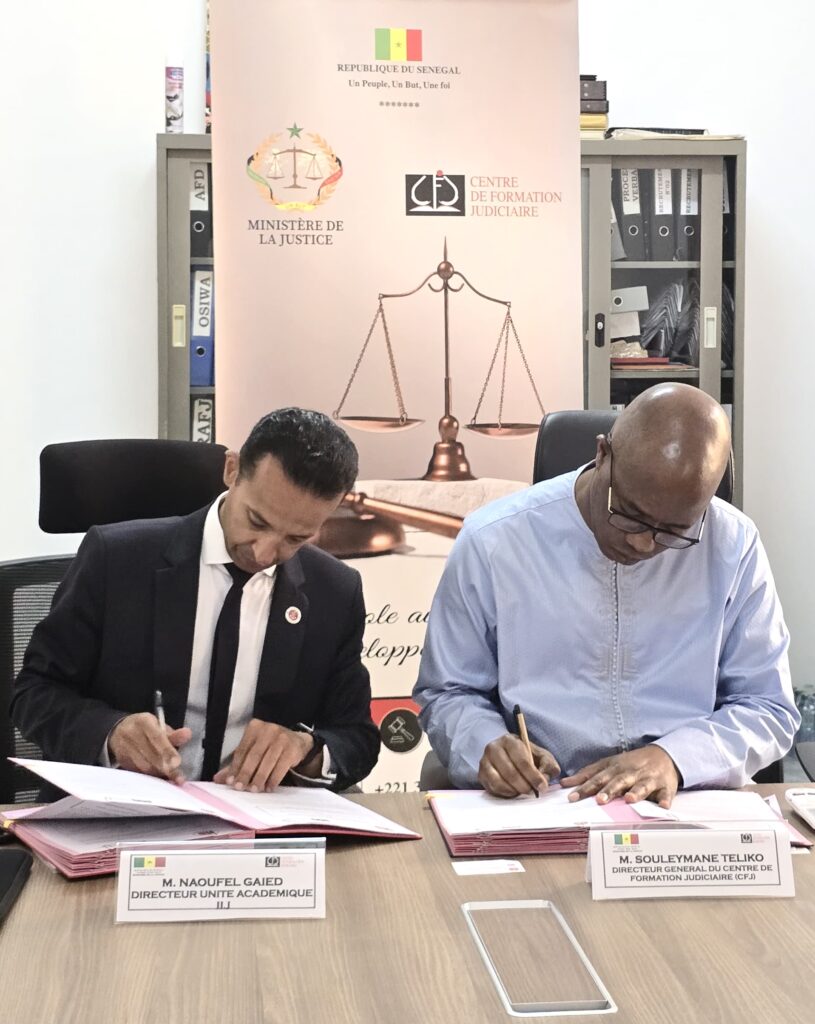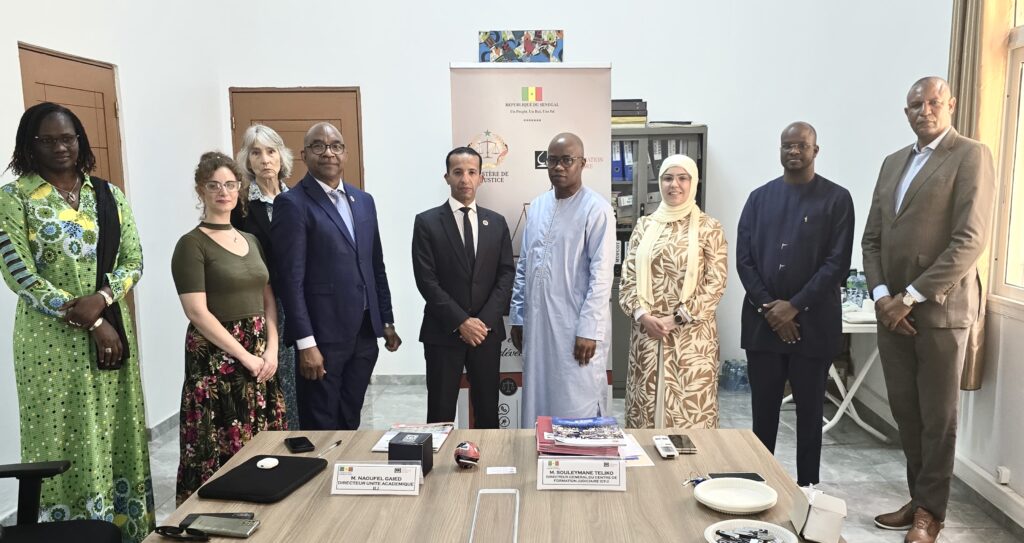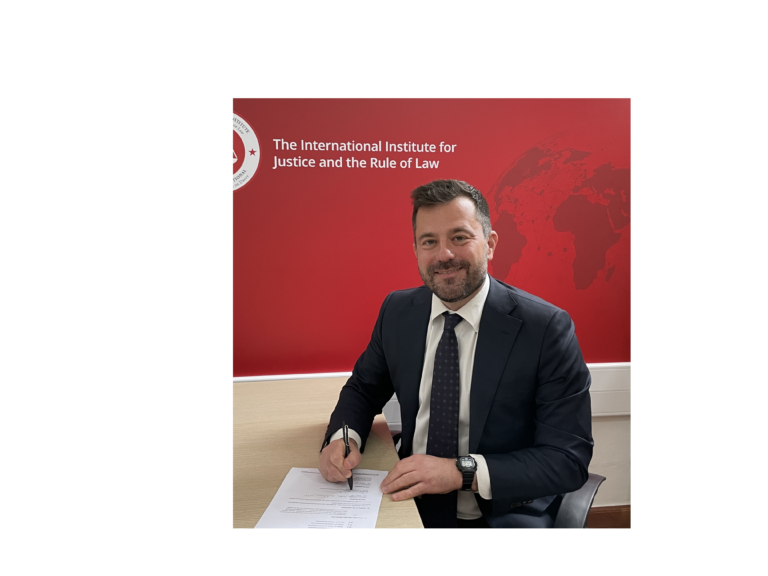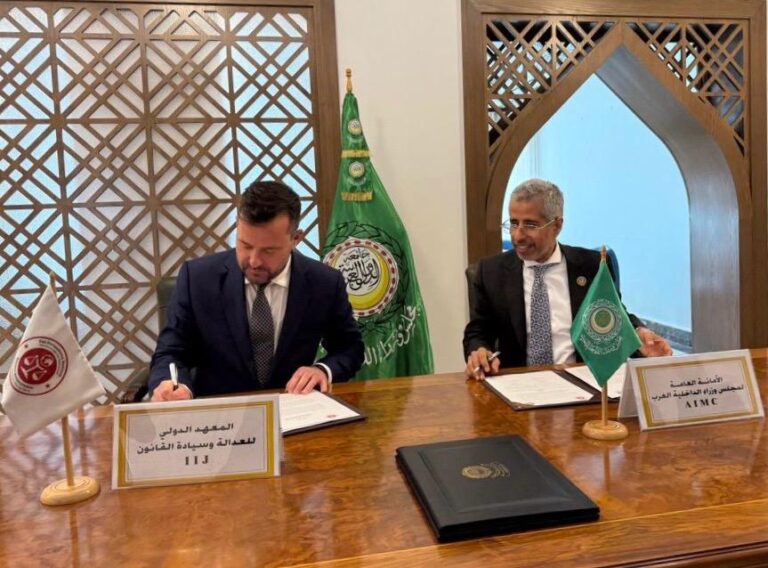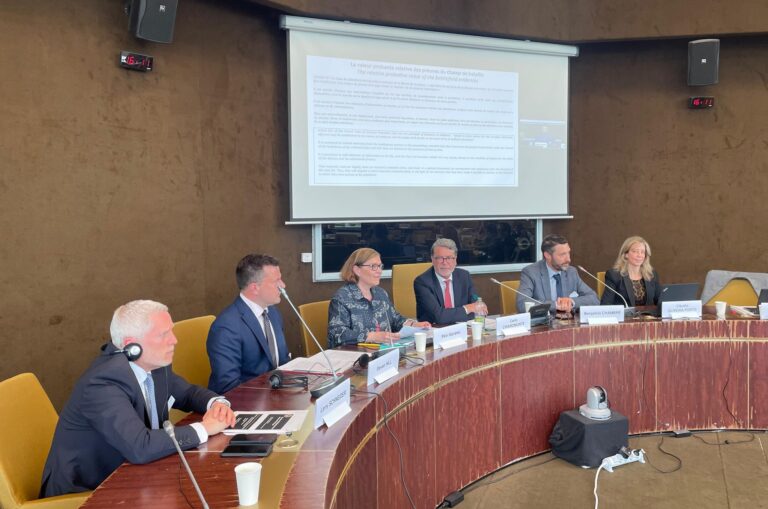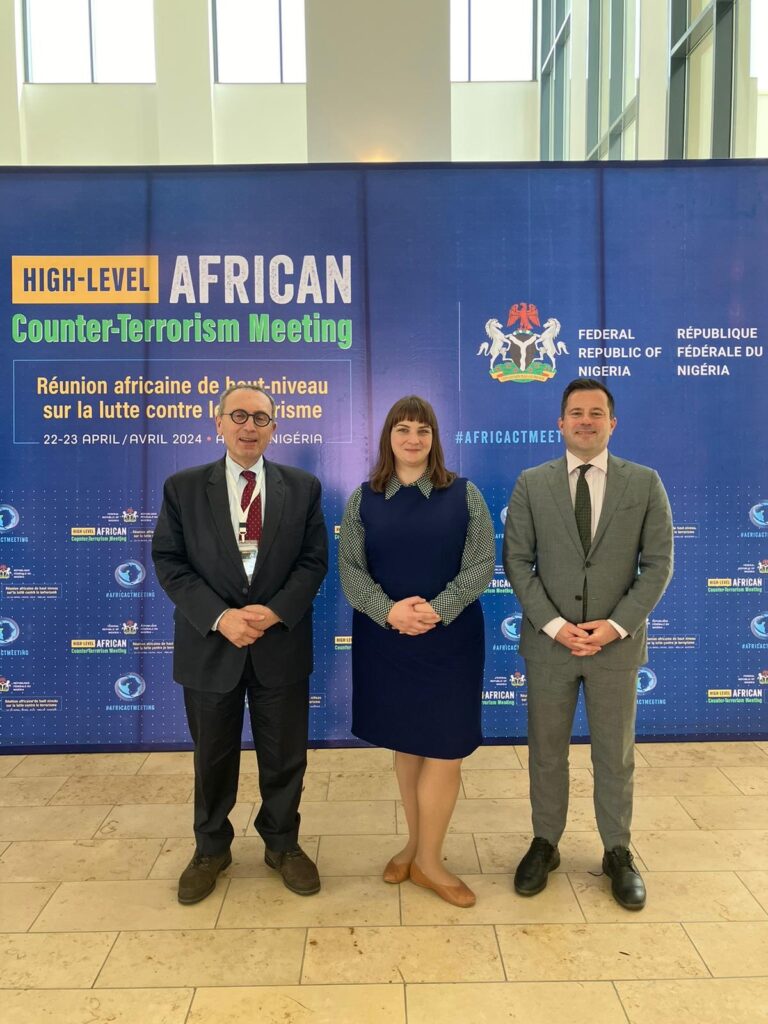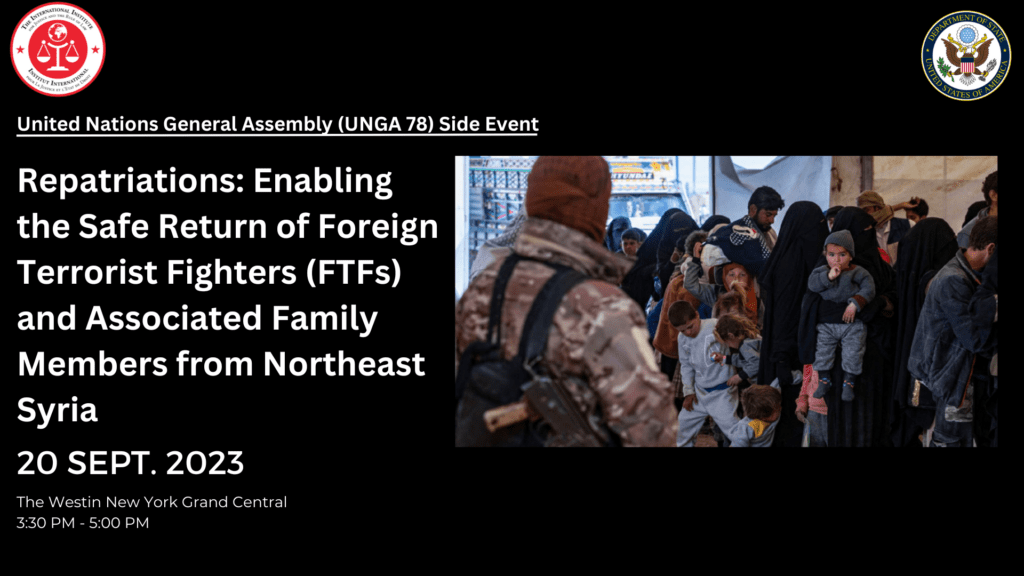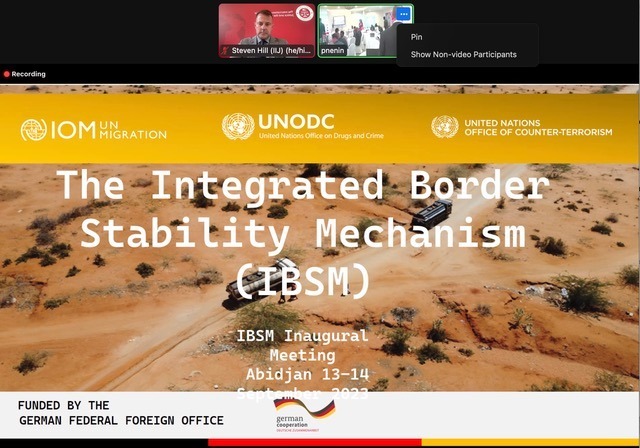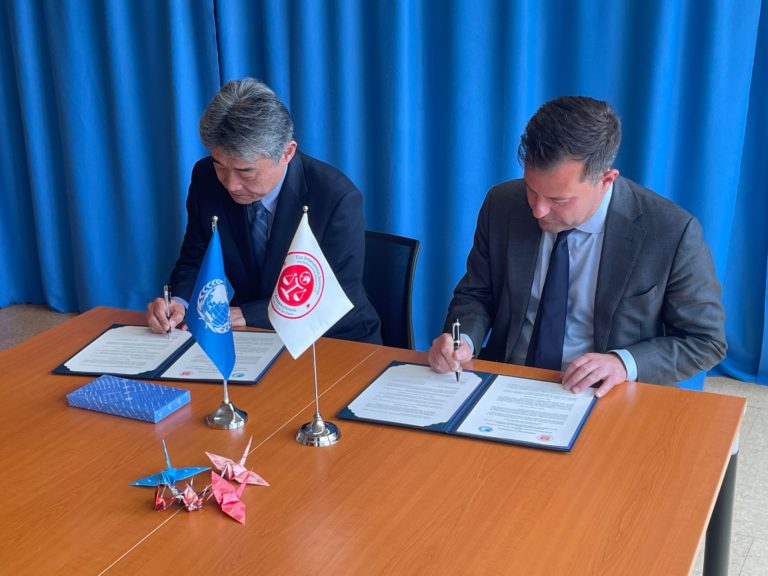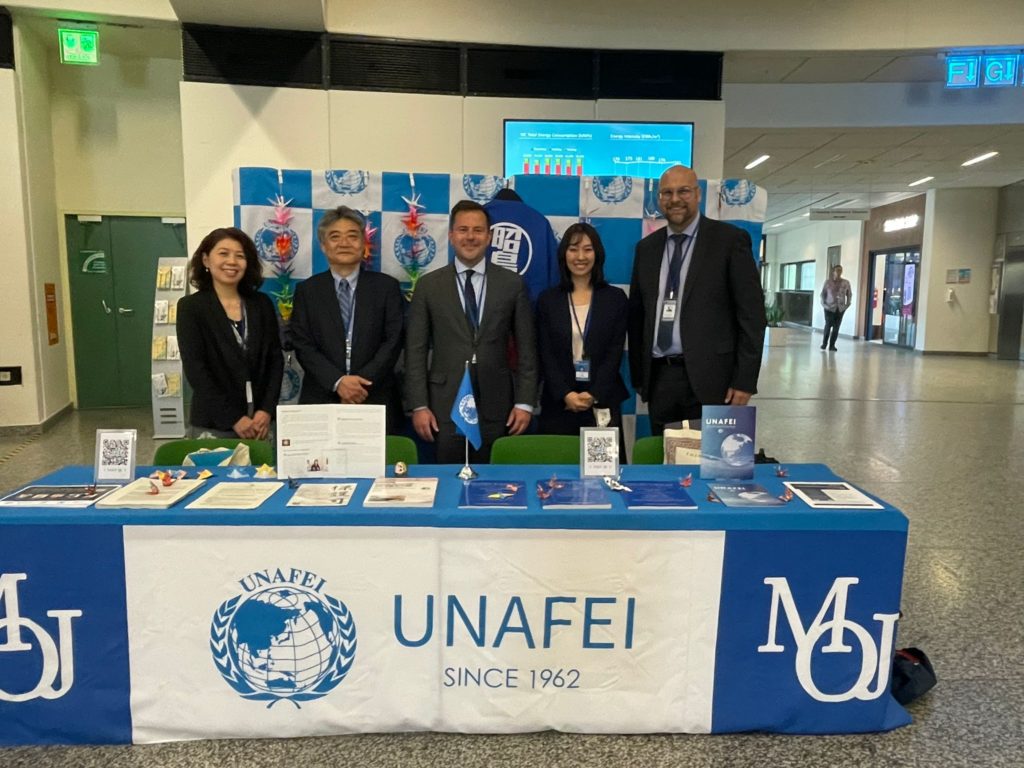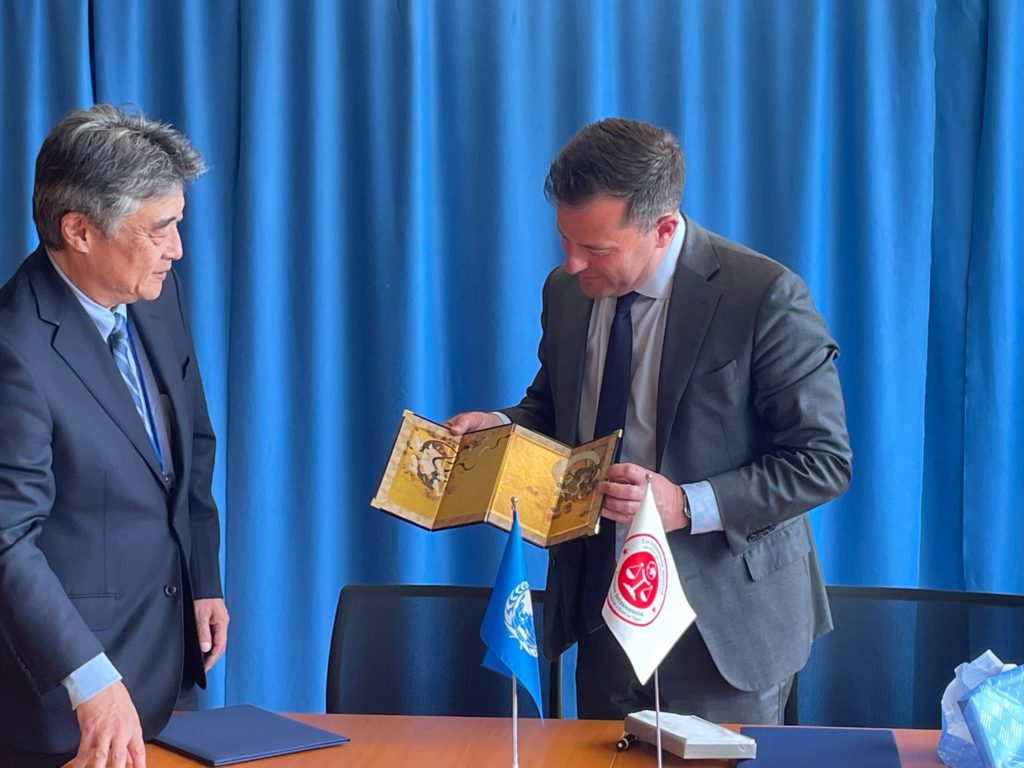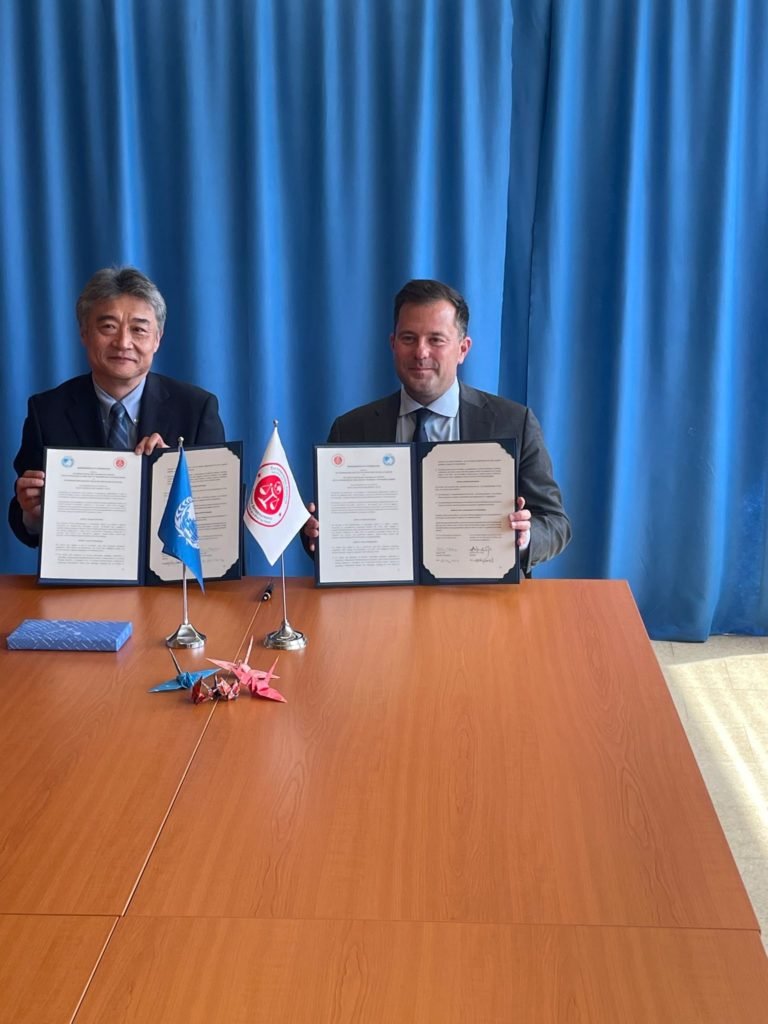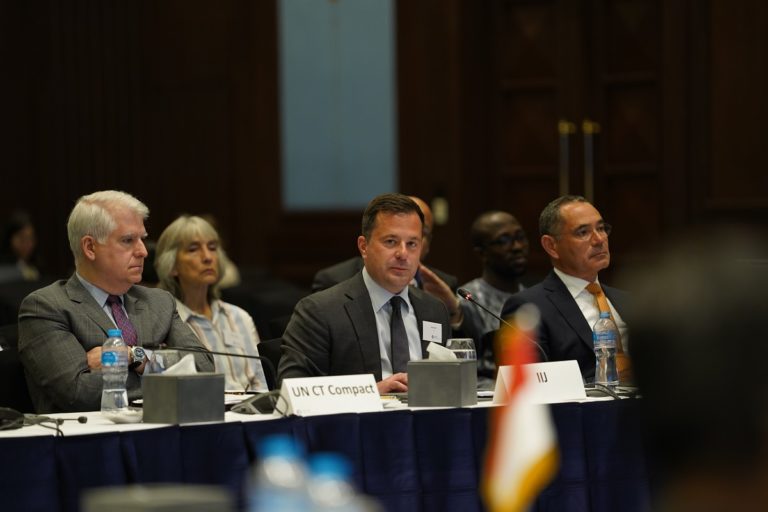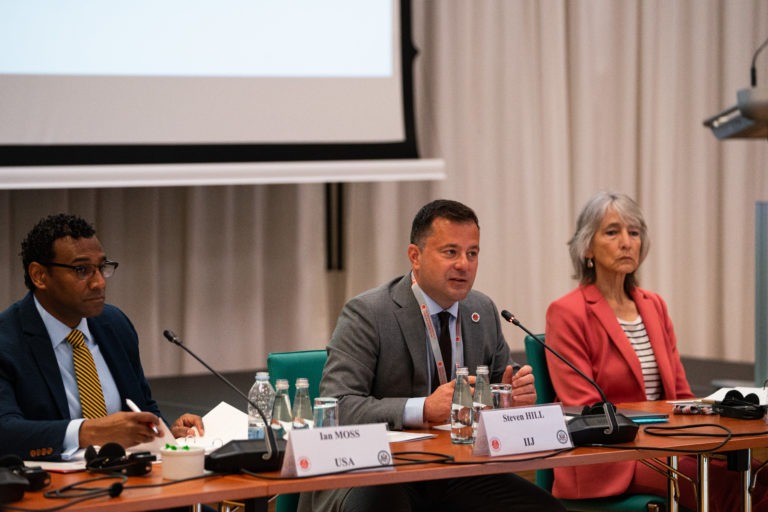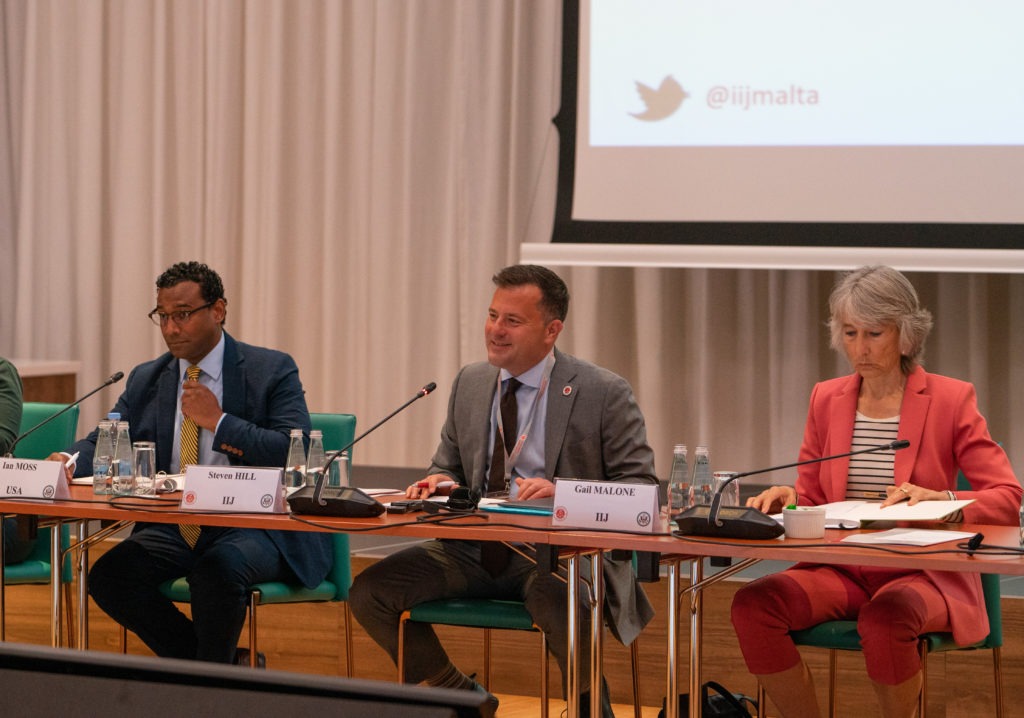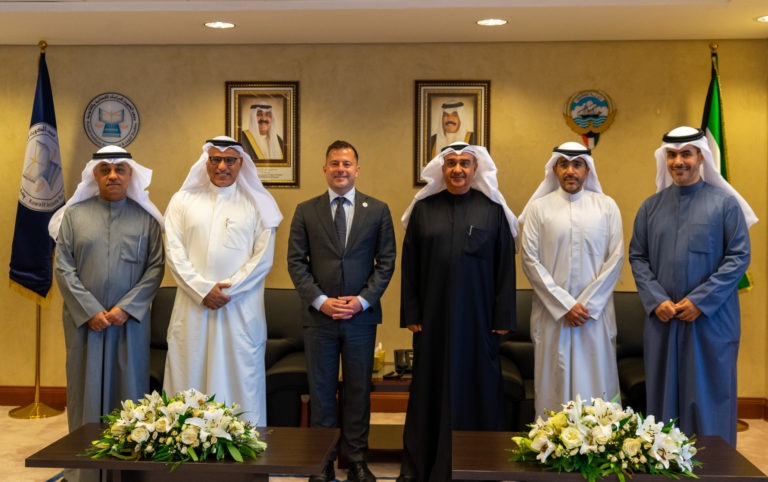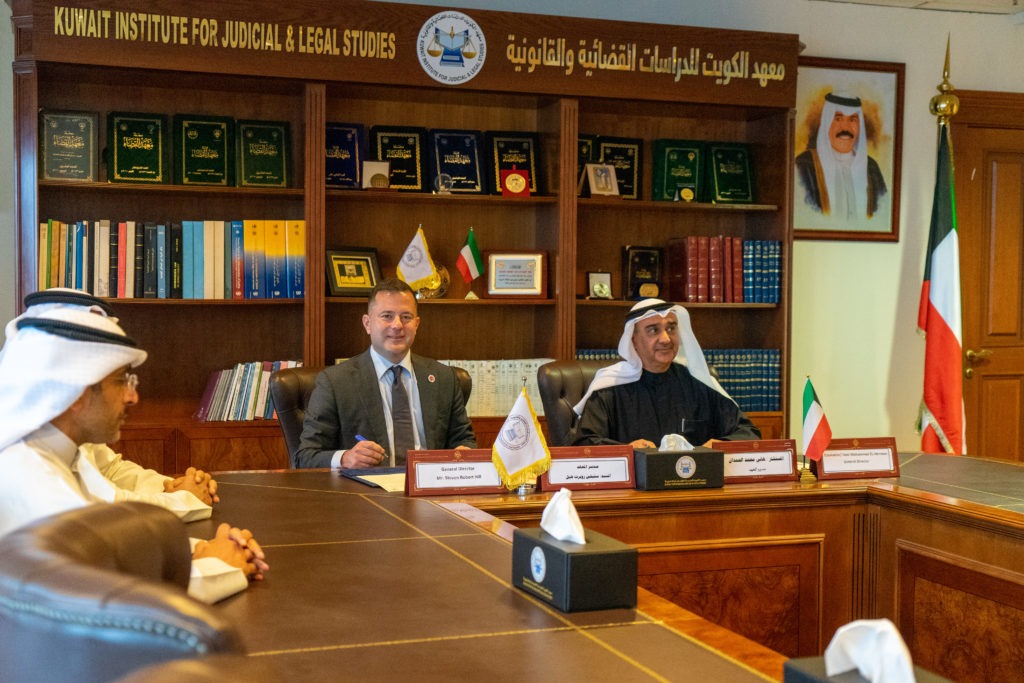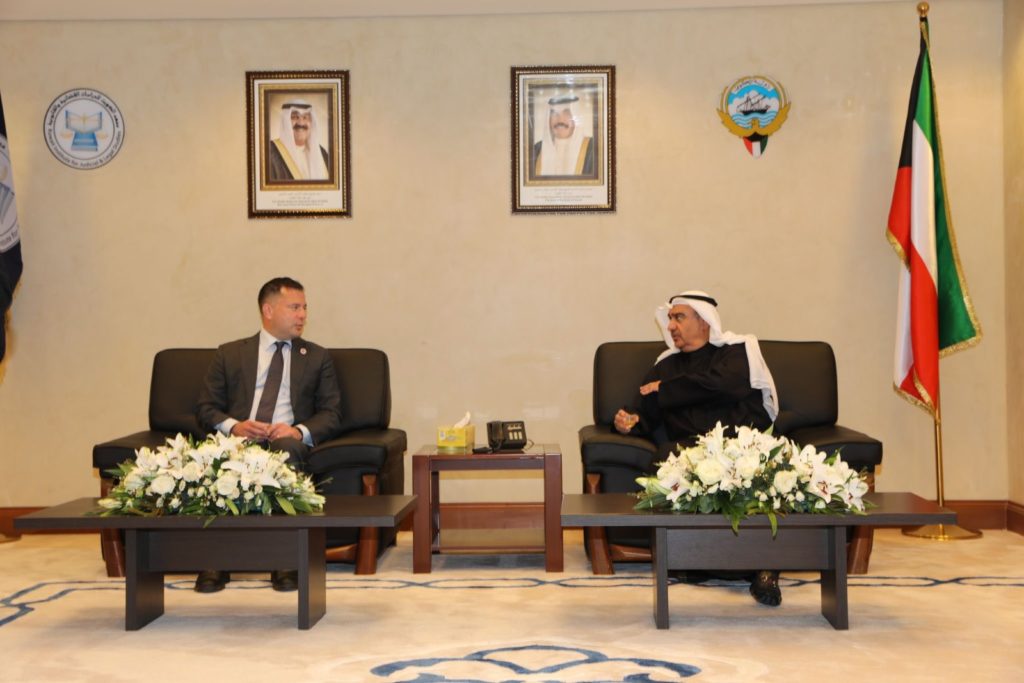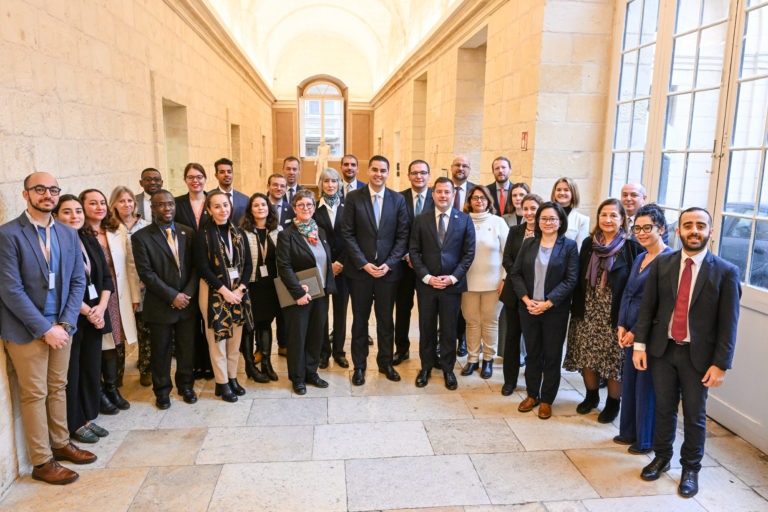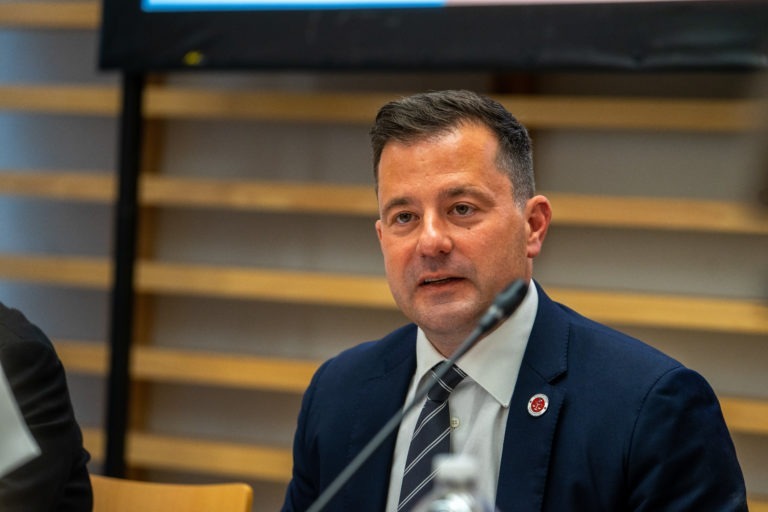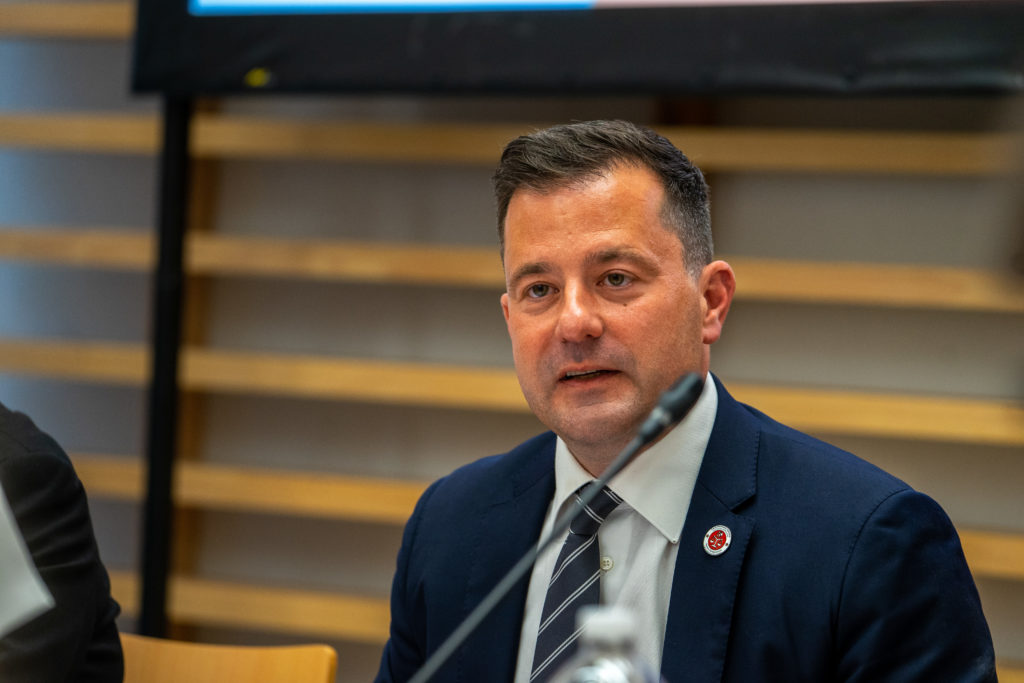Steven Hill
Executive Secretary
International Institute for Justice and the Rule of Law
Dear Chair, Co-Chairs and Members of Criminal Justice, Legal Responses and Countering the Financing of Terrorism Working Group,
Dear colleagues,
It is with great privilege that I address this esteemed working group on behalf of the International Institute for Justice and the Rule of Law. It is heartening to see so many familiar faces and friends in attendance. Over the past decade, the United Nations and the various entities represented here today have been invaluable partners to the IIJ.
As one of the three GCTF-Inspired Institutions, the IIJ is tasked with providing rule of law-based training to a diverse array of justice sector stakeholders, including lawmakers, law enforcement officials, prosecutors, judges, corrections officers, and others. Our mission extends to strengthening criminal justice systems and fostering regional networks among judicial, law enforcement, and other criminal justice practitioners. Our efforts align closely with the best practices outlined by the GCTF and the relevant Security Council resolutions, such as resolutions 1373 (2001) and 2617 (2021). We operate across Africa, the MENA region, and Southeast Asia, frequently collaborating with UN partners like UN CTED, UNODC, UNOCT, and OHCHR.
Our presence today reflects a collaborative effort aimed at complementing the work of our esteemed partners, including the GCTF-inspired institutions and national judicial schools. We value the exchange with the Global Compact entities and aspire for ongoing engagement beyond this occasion. Our partnerships are characterized by mutual cooperation, coordination, and a shared commitment to maximizing the impact of our initiatives while optimizing the use of resources. At times our partnerships are formalised in the form of a Memorandum of Understanding and at times we prefer a hands one approach working together on a case-by-case basis always having the objective in mind which is serving our practitioners in the best way we can.
As an institution committed to upholding the rule of law in countering terrorism and transnational crime, the IIJ delivered over 3,000 individual training days to 900 practitioners in 2023 alone. Through 28 tailored training and capacity-building activities, we focused on addressing the unique challenges faced by our core regions in Africa, the Middle East, and Southeast Asia.
In addition to our programmatic endeavours, we recognize the invaluable contribution of our alumni network, comprising over 9,000 criminal justice practitioners. As we celebrate our 10th anniversary, we plan to further enhance alumni engagement and strengthen connections within our global network.
With our host country, Malta on the Security Council, we work closely with them advancing their key principles security, sustainability, and solidarity. Our joint efforts include initiatives like the recent Arria Meeting, which cantered on enhancing Member States’ capacities for a gender-responsive approach to counter-terrorism, and we continue that collaboration in Malta’s role as OSCE Chair.
The IIJ’s work encompasses both shorter thematic programmes and longer courses, addressing a wide range of topics, including foreign terrorist fighters, terrorism financing, and politically motivated violent extremism. Let me now, highlight some key achievements that underscore our collaborative efforts with many of you.
Programmatic Unit (Financing of Terrorism)
Countering the financing of terrorism, or CFT, is one of the IIJ’s core workstreams. Effective CFT measures help prevent terrorist attacks by disrupting material support that terrorist organisations and lone actors use for weapons, training, travel and actual execution of attacks. They also help provide valuable information for ongoing investigations by identifying financial flows, withdrawals, asset transactions and footprints of purchases. IIJ offers capacity building for state CFT actors on effective tackling terrorist financing relying upon a systematic approach grounded in principles of rule of law and human rights.
In our work we rely on FATF Recommendations as key guiding document providing a framework on which countries can build strategies for comprehensive CFT action, and we use FATF thematic and regional reports for design and implementation of our capacity-building programmes. We also align our programming to the results of the Mutual Evaluations conducted by FATF and FATF-style regional bodies, tailoring the contents of our workshops to address deficiencies identified by evaluation reports and subsequent national risk assessments.
We also recognise the leading role of the UN system in setting the general framework for states on their obligations to counter terrorist financing, and we follow guiding documents developed by the GCTF, such as the Good Practices Memorandum for the Implementation of Countering the Financing of Terrorism Measures while Safeguarding Civic Space.
United Nations Office of Counter-Terrorism (UNOCT) is a core partner for IIJ’s CFT activities. Within the framework of the IIJ-UNOCT Memorandum of Understanding and corresponding Plan of Action, the two organisations have agreed to programmatic collaboration in a number of areas including CFT, in the forms of resource mobilisation, collaborative programme development and implementation, research and dissemination of knowledge.
UNODC provides expert support to IIJ activities and assists with outreach to state authorities and securing nominations capitalising on its wide field presence. CTED is a valuable partner for the IIJ due to its expertise in policy analysis and country assessments. Representatives of UN CTED monitoring teams and committees share their insights with participants at IIJ programmes, and the findings in CTED reports are used as basis for developing IIJ capacity-building activities. IIJ also participates in the CTED activities, such as the development of the set of non-binding guiding principles to address Threats and Opportunities Related to New Payment Technologies and Fundraising Methods in the implementation of the Delhi Declaration on countering the use of new and emerging technologies for terrorist purposes, or the launch of the Analytical Brief on Establishing Effective Public-Private Partnerships on CFT.
IIJ has also established partnerships with key CFT players such as the Egmont group and FATF-style regional bodies. These relationships are crucial to IIJ’s programming, as they bring broad expertise, region-specific knowledge, latest updates on trends and best practices, and also add high-level endorsement to our programmes, which is especially important when we start working with new countries and need political buy-in.
We also coordinate with international and non-profit organisations working in our regions of focus, such as AGA Africa and the Global Center on Cooperative Security, to avoid duplicating efforts, complement and build upon each other’s work, and mutually reinforce our expertise.
We started our CFT work in West Africa in 2021 with a series of regional workshops on mitigating risks associated with abuse of Designated Non-Financial Businesses and Professions – a high-risk sector that manages large amounts of cash but is not regulated like the banking sector. Our most recent workshop took place in Abidjan, Cote d’Ivoire, in October 2023. What started as an attempt to improve regional cooperation and assist participating countries in prosecuting and investigating terrorist financing cases resulted in a multi-year comprehensive project tackling the issue on all levels: policy and regulation, institutional mechanisms, risk-based supervision, inter-agency cooperation, public-private engagement, tracking financial flows, investigation, prosecution, sanctions, internal procedures for reporting entities, and more.
Since the first programme, we have worked with a of highly motivated professionals on creating robust CFT frameworks in their countries, and we are happy to see that this professional community remains dedicated to their work and reports positive improvements in their countries every year. This level of buy-in from national authorities is a crucial result for us, and it is our plan to continue this important work. In 2024 we plan to implement a Training of Trainers for the same group of professionals, aiming to support them in becoming true knowledge multipliers and in developing and implementing their own training programmes.
Apart from regional-level work, we also deliver country-specific programmes upon request by state authorities. We delivered such a programme in Nigeria in November 2023 after the country was placed on the FATF greylist. This comprehensive three-day training addressed key deficiencies in Nigeria’s CFT system, as identified in FATF evaluations, and supported priority areas outlined in the Nigerian CFT Strategy and Action Plan. These included gaps in interagency cooperation procedures, mitigating the risks of the non-profit sector and DNFBPs, regulation of virtual assets service providers, and border security implications on CFT, as well as existing procedural and regulatory challenges for effective investigation and prosecution of terrorist financing cases.
We continue to work closely with Nigerian authorities to sustain the results of the training, and also seek to continue this form of engagement with other countries as well.
In 2024 we are starting a multi-year comprehensive CFT project in Southeast Asia, which will include a wide range of topics, such as the use of social media for terrorist financing purposes, abuse of the non-profit sector for terrorist financing, mitigating terrorist financing risks associated with emerging payment methods and fintech, investigating financial networks of foreign terrorist fighters and returnees, and improving public-private cooperation on terrorist financing.
What distinguishes the IIJ CFT programmes is the careful selection of the profiles of the members of the country delegations and speakers – we place a lot of value on having the most relevant expertise at our programmes, and regularly receive positive feedback for these efforts. Our participants value us for creating an atmosphere of trust and free exchange at our programmes, which is essential for effective networking and fostering official and unofficial communication channels between different state entities and across participating countries. Our approach is also characterised by capitalising as much as possible on local and regional expertise as opposed to assigning key speaker roles to practitioners from the West, or the Global North, and we also make efforts to provide equal participation opportunities for men and women.
We promote the multi-stakeholder approach as it is key for CFT efforts – they require joint efforts from various state authorities and private sector. CFT regulations concerning several state actors or private sector have to be developed and amended in consultation with affected entities in order to make sure that they are implementable and effective, which is why it is important for states to foster mechanisms for interagency cooperation and public-private dialogue.
Rapid development of new technologies presents both a big threat and a big opportunity in the area of CFT. As technologies are actively used by perpetrators, the states’ efforts have to be directed at effective use of these technologies as opposed to imposing restrictions on them. The key to effective embedding of new technologies into government policies is public-private cooperation with the technology service providers, and we reflect that in our programmes.
We also recognise that regional cooperation and information sharing mechanisms play a crucial role in streamlining states’ CFT efforts and in processing terrorist financing cases with cross-border elements, so our programmes aim to foster the sustainability of these mechanisms and to minimize the impact of political factors that may affect their effectiveness.
Implementing Partner of the GCTF CJROL WG
I am also elated by the role the IIJ plays as a GCTF-inspired institution when it comes to the GCTF’s Working Group on Criminal Justice and the Rule of Law (CJROL WG). The IIJ has actively supported the work of Working Group as an implementing partner. The Working Group’s mandate focuses on promoting the recommendations of GCTF framework documents advocating for the respect for the rule of law in criminal justice matters, in particular in the field of terrorism investigations and prosecutions.
Our support to the Working Group and its mission took several forms so far. First, we lent a hand to the Group and its Co-Chairs in the planning and strategizing of their work by sharing substantive insights during the Working Group’s discussions on their 2022-2024 Workplan. In addition, we organized the Working Group’s annual plenary meeting in Malta in the Spring of 2023 and are currently coordinating the preparations of its 2024 plenary in Nigeria in May 2024.
Secondly, as an implementing partner, we also focus on advancing the key recommendations for the GCTF’s framework documents related to criminal justice and rule of law. We can cite several examples including the Global the Survey on Fair Trial Rights in Terrorism Cases led by the IIJ under the auspices of the EU-funded CT PHARE project, that I refer to next. In addition, we are organizing an expert meeting for the Working Group in May 2024 which will tackle the challenges posed by witness and criminal justice officials protection in the context of terrorism prosecutions and adjudications. As a result of the discussions at the expert meeting, we will develop a toolkit to operationalize GCTF’s good practices on witness and criminal justice officials’ safety and security.
Counter-Terrorism Platform for Human Rights Engagement (CT PHARE)
Our Counter-Terrorism Platform for Human Rights Engagement (CT PHARE) is designed to raise the awareness of Human Rights in the context of counter-terrorism responses. CT PHARE is an EU funded global facility with the strategic objective to increase the degree to which states’ counterterrorism policies, legislation, and judicial strategies, in addition to day-to-day investigation and prosecution practices, comply with internationally recognized human rights standards both on the policy and the operational levels.
CT PHARE will address these key issues, by focusing on the following specific workstreams: (i) Oversight and accountability mechanisms in the context of countering terrorism to seek redress for victims and to monitor government policies in counter-terrorism; (ii) Protection of human rights in a context of militarized responses to terrorism; (iii) Pre-trial detention and the right to a fair trial; (iv) A fourth flexible workstream for requests from EU Delegations and EU/Security Experts.
Since 01 May 2023, CT PHARE conducted a total of 9 activities which included 1 Experts Group Meeting, a global survey on the practical uses of The Hague Memorandum Good Practice 5 and The Rabat Memorandum Good Practice 7 under the workplan of the Global Counterterrorism Forum (GCTF) Criminal Justice Rule of Law Working Group (CJ ROL WG), 5 capacity building activities, a GCTF CJ-ROL WG side event at the margins of the 13th GCTF Ministerial Meeting, and a Transregional Event on the margins of the GCTF 23rd Coordination Committee Meeting in Nairobi. The survey related to the Pre-trial and Right to a Fair Trial as mentioned for workstream (iii). It is expected the survey to be endorsed by the GCTF co-chairs (EU & Egypt) at the end of March 2024.
I wish to acknowledge the support and participation of UN Global Compact Entities (CTED, UNOCT) on CT PHARE activities conducted in Kenya for Anglophone African countries, in Morrocco for Francophone African countries, in Indonesia for Southeast Asian countries, and in Jordan for the MENA countries. For the Francophone African countries activity in Morrocco, the Head of UNOCT Programme Office for Counter-Terrorism and Training in Africa participated in this event. In February 2024, CT PHARE convened a 2-day Transregional Event in Nairobi, on the margins of the 23rd GCTF Coordination Committee Meeting bringing participants from all four regional events and GCTF delegates to socialise the Framework Document and to further discuss the Good Practices in Oversight and Accountability Mechanisms in Counter-terrorism. Again, UN Global Compact Entities (CTED) participated.
Planned Activities in 2024
CT PHARE focus will be on Protection of human rights in a context of militarized responses to terrorism workstream (ii), Pre-trial detention and the right to a fair trial workstream (iii), whereby conducting capacity building activities to enhance the operationalization of the outcomes from the survey finding under the workplan of the GCTF CJ-ROL WG. Of course, work on finalising the GCTF EU led initiative on developing a Framework Document on Good Practices in Oversight and Accountability Mechanisms in Counter-terrorism will continue throughout 2024, leading to the anticipated endorsement of this document in September at the 14th GCTF Ministerial Meeting in New York.
Regarding the Protection of human rights in a context of militarized responses to terrorism workstream (ii), CT PHARE will deliver activities for Francophone African countries in Abidjan, Ivory Coast from 16-19 April 2024. This same activity will be replicated for Anglophone African countries and delivered in Tanzania from 21-24 May 2024.
CT PHARE team are already engaged with the UNODC Regional Coordinator of the Terrorism Prevention Branch based in Dakar, and invited UNODC to attend this activity. The CT PHARE team is again engaged with UNOCT Programme Office for Counter-Terrorism and Training in Africa for these two events. The activities themselves of four-day duration consist of working sessions, lessons learned and interactive discussions to improve participants’ understanding and application of the Human Rights-Based DMM in counter-terrorism interventions and crisis management.
Regarding the Pre-trial detention and the right to a fair trial workstream (iii), activities will be delivered for Francophone African countries and Anglophone African countries between October and December 2024. Concept Notes will be developed from action points contained in the Survey Report on The Hague Memorandum Good Practice 5 and The Rabat Memorandum Good Practice 7 under the workplan of the GCTF CJ ROL WG once endorsed by the GCTF co-chairs (April 2024). Again, CT PHARE will engage with UN Global Compact Entities covering human rights in CT across these regions.
Lastly, turning to the longer courses we are delivering at the IIJ.
Academic Unit
Since 2020, the Academic Unit has been more specifically entrusted with the design and delivery of in-depth, sub-regional and sometimes national training courses on the handling of terrorism proceedings for investigators, prosecutors and judges, entitled “Counter-Terrorism: Academic Curriculum”, known by the acronym CTAC.
These selective and intensive courses cover the main knowledge and skills required, from the initial event (a terrorist plot or attack) to the trial, in a very practical way and using a peer-to-peer approach.
The Investigation and Prosecution Counter-Terrorism Academic Curriculum (IP CTAC) course will build prosecutors’, examining judges’, and investigators’ capacities on proactive, as well as reactive, investigations and prosecution of terrorists and other related transnational crimes. Each course includes an online component, which can also be a standalone course, the eCTAC course, dedicated to proactive investigations.
Meanwhile, the IIJ’s Trial Judges CTAC (TJ CTAC) course- which also include an online component, is designed to increase judges’ capacities for adjudicating terrorism-related cases and focuses on the unique needs and roles of trial judges in counter-terrorism proceedings.
All the CTAC courses are adapted to the specific needs and legal frameworks of the IIJ’s partner countries and delivered in the main practitioners’ respective working languages (Arabic, English or French). Each course is intended to include no more than 25 participants to facilitate strengthening the practitioners’ knowledge and skills as well as enhance their networking opportunities and mutual support. The selection of countries for these courses is based on the partner States’ shared institutional, judicial and operational needs – including a common working language, similar terrorist threats, cross-border counter-terrorism procedures, a shared common law legal tradition, and an opportunity to improve international judicial cooperation.
1. The IIJ being a hub, the Academic Unit promotes the publications of the UN and its various agencies, and the resources, reports and guides produced by the UN are of course integrated into all the learning content available to IIJ alumni, in French, English and Arabic, as are other relevant resources for practitioners.
2. The IIJ being a training centre, through its approach based on individual and collective work, the Academic Unit contributes to the effective appropriation of these resources and tools, for example the models for letters rogatory and extradition as established and recognised internationally. It is noteworthy that these tools can be adapted on a national level and are used by practitioners in the field of terrorism, organised crime and criminal procedures in general.
3. The Academic Unit also has recourse to UN expertise for the design and delivery of CTAC courses,
o Expertise which it has first and foremost internally, via the resident fellows who have served the United Nations, either under the UNODC or under CTED, and who have been able, in the case of Prosecutor Samna for example, to be one of the founding practitioners of the WACAP network.
o Externally, the Academic Unit also has recourse to collaboration with experts from the various UN agencies, whether it is a question of better understanding the threat through the intervention of CTED or the Counter-Terrorism Committee and the ISIL (Da’esh) and Al-Qaida Sanctions Committee, or on a more technical level, for example in investigations or cybercrime with the UNODC.
4. The Academic Unit trains and relies on practitioners who are former or actual members of UN networks and agencies, the objective being to train front-line practitioners. Investigators, prosecutors and judges are often also members of UN networks such as WACAP or SEAJUST or have even been or become agents of UN agencies or networks before or after the CTAC (WACAP, SEAJUST, MONUSCO, MINUSCA).
5. The Academic Unit is developing the network of practitioners who are already or will be members or associates of the UN by creating a dynamic community of practitioners which already has more than 200 practitioners from 35 countries who, having been trained together and having worked together, keep in touch with each other and with the IIJ via activities or Alumni meetings.
6. Finally, the Academic Unit is honoured to be also invited to take part in meetings and work of the UN, for example the GCTF WA group on the treatment of improvised explosive devices, the annual WACAP meetings, or very recently at the invitation of UNAFEI in Tokyo, for training in French African practitioners on juvenile justice and in the future this year with UNOCT.
18 CTACs have already been designed and delivered since November 2020. More than 8 programmes are planned this year in French, English and Arabic for African practitioners from the MENA region and South and South-East Asia, and thanks to the confidence of our donors, our multi-annual programme is expanding and will undoubtedly enable us to strengthen our partnerships with the UN even further.
Dear colleagues,
This brings me to the end of my presentation. Let me conclude with three main messages.
Cooperation with the entities within our partners of the Global Compact is crucial for the IIJ, as demonstrated in my presentation. I encourage you to connect with either myself or my colleague, Reinhard Uhrig, if you are keen on delving deeper into our work, attending events, or, even better, collaborating with us.
As highlighted, we possess a diverse toolkit, despite being a small organization currently operating solely from Malta while providing courses many regions of the world. We have various avenues for partnering with regional entities, addressing topics that align, either wholly or partially, with those of our global partners.
We highly value the exchange with Global Compact entities and aim for sustained engagement beyond this event. Our participation in the Resource Mobilization and Monitoring and Evaluation discussions in November 2023 was invaluable.
While we understand that, for now, our involvement may be on an ad hoc basis, we remain hopeful for future opportunities to continue our exchange.


